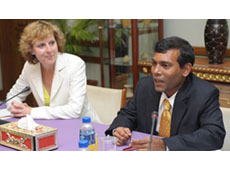The European Union has contributed EU€6.5 million (US$8.8 million) to the newly created Climate Change Trust Fund which aims to help the government of the Maldives in its bid to become carbon-neutral by 2020.
Minister of Finance Ali Hashim signed the tripartite Memorandum of Understanding (MoU) on behalf of the Maldivian government at a “little ceremony” held at the President’s Office this morning.
World Bank Country Director for Sri Lanka and the Maldives, Naoko Ishii, signed on behalf of the World Bank, and Ambassador of the European Union to Sri Lanka and the Maldives, Bernard Savage, on behalf of the EU.
The ceremony was attended by President Mohamed Nasheed, Vice President Dr Mohamed Waheed, Minister of Foreign Affairs Dr Ahmed Shaheed and State Minister of Foreign Affairs Ahmed Naseem, Minister of Health and Family Dr Aminath Jameel, members of the Danish delegation and other senior members of government.
Climate change trust fund
The trust fund will be administered by the World Bank for a period of three and a half years, with the majority of resources being used by the government to conduct their projects relating to climate change adaptation and mitigation.
The World Bank will offer security for donors and hopes more countries will add to the fund to help the Maldives break its dependency on fossil fuels.
The government intends to use the trust fund to “strengthen knowledge and leadership” in the government, build “adaptive capacity” through pilot programmes, develop renewable energy through low-carbon options and Public Private Partnerships (PPPs) and “improve policy and institutional capacities” in both public and private sectors to deal with adaptation and mitigation of climate change.
The trust fund will also be used to strengthen coastal protection, biodiversity conservation, tourism, fisheries industry, solid waste management and energy solution.
A Climate Change Advisory Council will be established and will include members from the government and will “provide strategic direction to the climate change activities under the trust fund.”
There will also be a Technical Committee composed of experts from the government, private sector and civil society. This committee will be responsible for reviewing and recommending project proposals for financing and monitoring the progress of the trust fund programme.
EU on climate change and the Copenhagen Accord
The European Union is the first to donate to the Maldives’ Climate Change Trust Fund and is paving the way for other countries and financial institutions to do the same.

After the last international climate change summit in Copenhagen last year, President Nasheed proved himself to be an influential figure in the fight against climate change.
According to the CIA World Fact Book, the Maldives has the 174th largest population in the world out of 237 countries, but despite its small population and current status as a Least Developed Country (LDC), it has shown unmatched initiative in combating climate change.
Conversely, China and India, who are the two largest populations in the world and according to the New York Times are “among the largest and fastest-growing sources of greenhouse gas emissions in the world,” had not agreed to join the Copenhagen Accord until March 2010.
President Nasheed’s urge to “move into the Green Age” has made the Maldives a global voice on the issue.
The creation of the trust fund coincides with the EU’s newly appointed Commissioner of Climate Action, Danish national Connie Hedegaard, who is in the Maldives for two days to see the impacts of climate change in the country and oversee climate change adaptation programmes.
Hedegaard is currently running the EU’s climate change policy and will be departing for India after her visit to the Maldives.
Signing ceremony
Minister Hashim said this MoU showed the government is “making progress” on climate change adaptation, and noted that this was one of the promises the government made before they came to power and one of the “key elements…that we will deliver to the people.”
Ambassador Savage noted he was the very first European commissioner to visit the Maldives and found it “very appropriate” that he is the commissioner in charge for climate change action, “the very subject of the MoU that were are signing here today.”
He said climate change mitigation “demands urgent, cooperative and shared responsibility” and the “EU welcomes the opportunity to assist the government of the Maldives” to fulfil their pledge of carbon neutrality.
“The EU is and has always been a real friend of the Maldives,” Savage said, “so this MoU is a further indication of that friendship and also a recognition by the EU of the priorities set for the country’s development as it moves through this democratic change and into the future.”
He said the EU “recognises, shares and participates in the priorities set by the government of the Maldives and we wish to further cement that partnership as we move forward.”
Savage added that signing the MoU “in such distinguished company” showed the importance of climate change to both the Maldives and the EU.
Naoko Ishii said the World Bank thought the government’s bid to be carbon-neutral by 2020 was “a very ambitious goal but it’s not impossible to achieve.”
She said the World Bank was inspired by the government’s way of dealing with this challenge and hoped the trust fund “will really help you achieve your vision.”
“It’s crucial for Maldives to build a climate resilient economy and society through adaptation,” she said.
Ishii said “this could be a real opportunity for other donors to come in and help the government,” and was “so pleased to see there is an actual instrument to realise [the] dream [of carbon neutrality].”